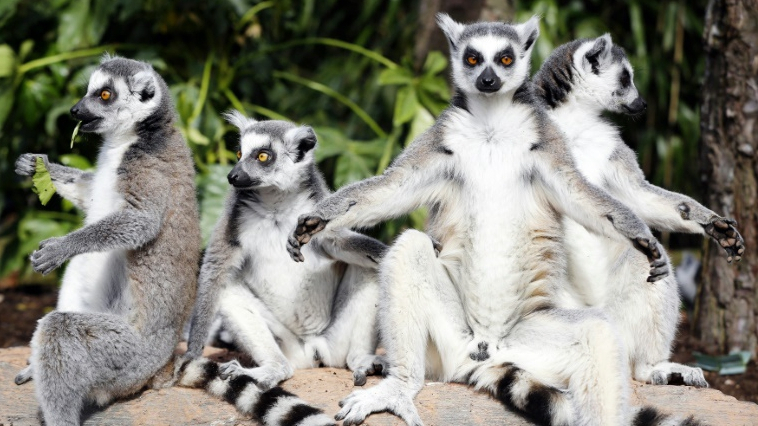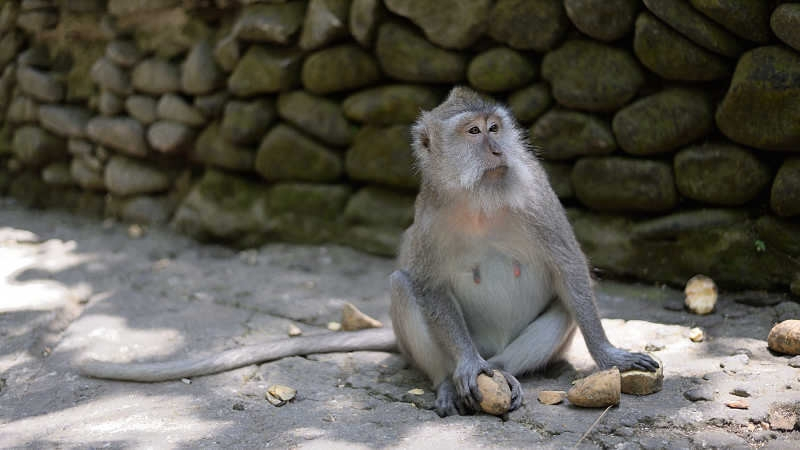The "World Monkey Day" is observed on December 14 every year as an unofficial international holiday. Though it celebrates "all things simian," including other non-human primates such as apes, tarsiers, and lemurs, the day is named after monkeys. Here are some fun facts about our primate friends on the special day.
1. Don't be confused by the names
In Chinese, lemur, loris, galago (bushbaby) are called "fox monkey", "lazy monkey" and "baby monkey." However, they are not monkeys. In fact, these species are cousins of the monkey family. Tarsier ("spectacled monkey" in Chinese) is not from the monkey family either.

Lemurs do not belong to the monkey family.
Lemurs do not belong to the monkey family.
2. Monkeys cannot evolve to be humans
Monkeys, apes, and humans share a common ancestor, which lived on the planet some 60 million years ago. Therefore, all extant monkeys are our biological cousins, not our ancestors. We have gone on different ways of evolution, so monkeys will not grow into humans, no matter how much time is given.
3. How to tell apart monkeys and apes?
The quickest way is by looking for a tail. All apes (including us) do not have tails, while most monkeys do. The only exception is Barbary macaque, the only monkey in the world without a tail.
Or you may try and remember who they are:
Monkeys: baboons, macaques, marmosets, tamarins, capuchins and sakis
Apes: humans, gorillas, chimpanzees, orangutans, gibbons, and bonobos
4. World's smallest monkey can stand on your palm
The pygmy marmoset can be as small as 117 millimeters, with a 172-millimeter tail. It weighs just over 100 grams, roughly the weight of two eggs.
5. While the largest can even fight hyenas
A male mandrill can be 1 meter tall, weighing up to 54 kilograms. In Hollywood blockbuster The Lion King, Mufasa's chief adviser, Rafiki, is an old mandrill.
6. World's rarest monkeys
A total of 68 species of primates are classified as "critically endangered" on the International Union for Conservation of Nature (IUCN) Red List. Among them, the Myanmar snub-nosed monkey and the blond titi monkey have populations fewer than 300.
7. How smart are monkeys?
Monkeys are usually curious to try new things, and they learn new things reaching out with their hands to experience the world. Scientists have proved that monkeys are as smart as a three-year-old child when it comes to solving puzzles. Some scientists even believe that monkeys actually pass information from one generation to the next. They have their own language and social structure, can use tools, and are able to teach the younger generation much of what they know.

Wild macaque monkeys have learned to use tools to crack open nuts and even shuck oysters.
Wild macaque monkeys have learned to use tools to crack open nuts and even shuck oysters.
8. Monkeys have been to the space!
A total of thirty-two monkeys have been to the space. The first primate astronaut was Albert, a rhesus macaque, who rode to over 63 kilometers on a rocket on June 11, 1948. Sadly, Albert died of suffocation during the flight. In the following year, Albert II became the first monkey and the first primate in space as his flight reached 134 kilometers.
9. Monkeys play important roles in many cultures
Many Asian countries, including China, Japan and India, worship the monkey god. In Japanese folklore, three wise monkeys together embody the proverbial principle to "see no evil, hear no evil, speak no evil." In India, the monkey god Hanuman is a prominent deity who is believed to bestow courage, strength and longevity to the person who worships him. In China, everyone is very familiar and fond of the fable character Sun Wukong "Monkey King" of the famous comedy fiction Journey to the West.
10. Were you born in the Year of Monkey?
In Chinese zodiac, the monkey is the ninth in the twelve-year cycle. The next Year of Monkey is 2028. You can calculate your zodiac by subtracting 12. For example, if you are born in the year 2016, 2004, 1992, 1980, you are a monkey person according to Chinese calendar.
(All pictures via VCG. Cover photo designed by CGTN's Yin Yating. Edited by An Qi)
(If you want to contribute and have specific expertise, please contact us at nature@cgtn.com.)